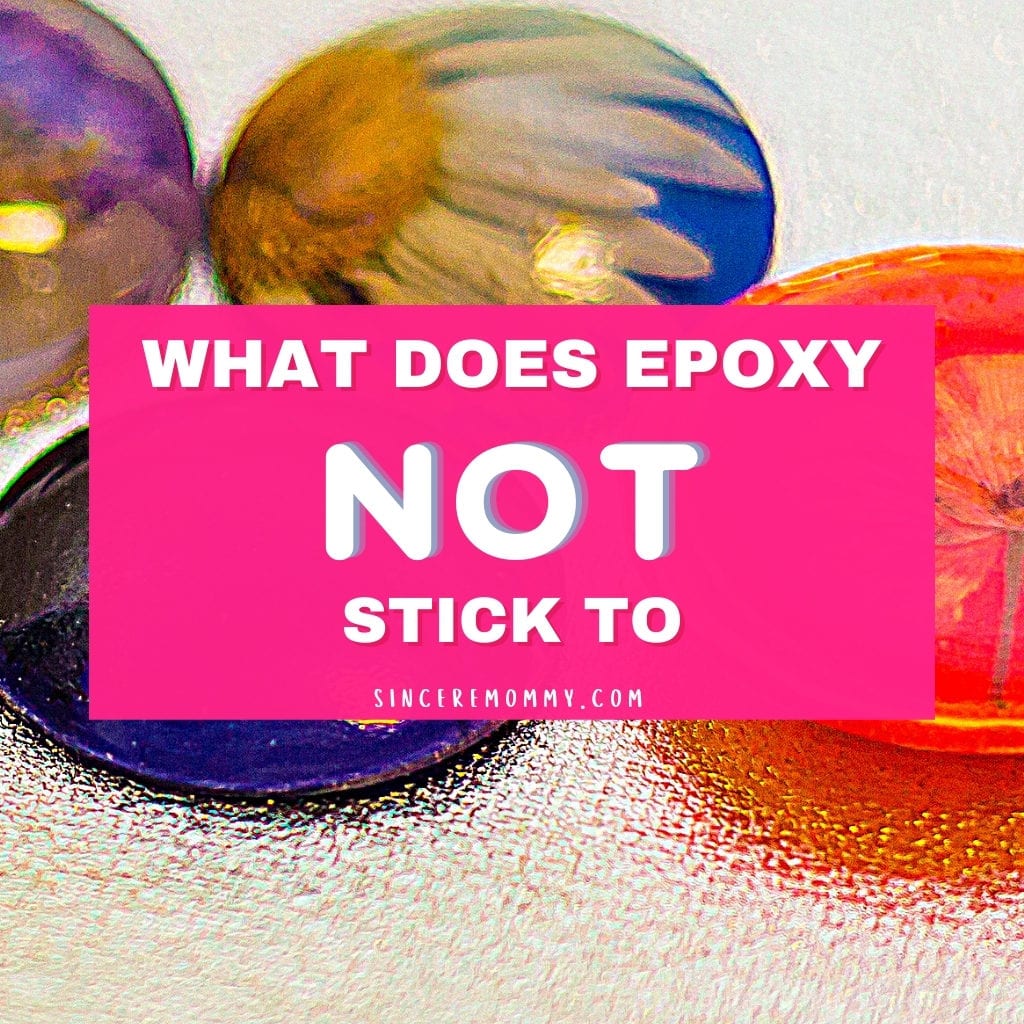Today I’ll be covering a super common question that many people have about epoxy resin. If you’ve attempted to work with epoxy you will have quickly realized that it is very sticky. You may have also realized that if it hardens on certain surfaces it doesn’t come off easily or at all! So what does epoxy not stick to? Let’s get into it!
*As an Amazon Associate this post contains affiliate links. This means I may receive a small commission if you should choose to click and purchase something through them. This is at no extra cost to you.
Table of Contents
Silicone
This is one of the most popular and effective materials for epoxy resin casting. Epoxy resin bonds very poorly with silicone, making it perfect for making molds.
Pro tip: Depending on the surface of the silicone mold you are using, your epoxy project could be smooth and shiny or dull and textured. It truly depends on the quality and design of the silicone mold.
I personally love using a silicone mat for working with resin. I can use my mat on pretty much any table surface and know that it is protected.
In addition to the silicone mats and molds I prefer to use silicone stirring sticks for mixing my epoxy resin up. It reduces waste and makes for a much easier clean up afterwards.
Saran Wrap aka Polyethylene
Saran wrap is also something that epoxy resin does not stick to. For this reason many resin artists opt to cover their work surface in saran wrap for an easy clean up.
In fact epoxy resin does not stick to many plastics in general, but there are some exceptions.
Tyvek tape is made of polypropylene which epoxy resin also does not stick to. This means you can use this tape in many types of projects that require some creativity.
Some artists use Tyvek tape on the back of their open bezel pendants to keep resin from leaking everywhere, but also so they can remove it once the resin has cured.
Vinyl
Vinyl is another material that epoxy resin will not stick to. However you can still seal a vinyl decal with resin.
For example if you want to make a wooden sign with vinyl wording from an SVG cut file, you could simply pour the epoxy resin over the vinyl and allow it to cure. Epoxy resin bonds well with wood so it should keep your vinyl secure.
If you want to learn more about types of vinyl or projects you can make with it, you can check out “How To Make Vinyl Decals and 10 Ideas For Using Them“.
Wax Paper
Epoxy resin does not stick to wax paper. This makes it another useful tool for protecting other surfaces or for making special projects.
Teflon
While not as common as some of the other materials I mentioned, it still could come in handy. Epoxy resin does not stick to teflon aka polytetrafluoroethylene.
This chemical compound is used to coat a variety of things, but mainly is known for its heat resistant properties. It is often used in frying pans or ironing boards.
Mylar
I doubt you have this lying around, but it is yet another material that epoxy resin does not stick to. Chemically know as biaxially-oriented polyethylene terephthalate, mylar is essentially a stretched sheet of plastic.
You have probably most commonly seen this used to make helium balloons. It is used to keep gasses like helium because of how airtight it is.
Nylon
This material essentially represents a category of synthetic polymers. Nylon is used for a variety of applications so you probably have items around the house made of this.
Epoxy resin does not stick to nylon itself. Nylon is used to reinforce other materials so I would be careful when deciding on what to use with epoxy resin.
Just because something contains nylon, it does not necessarily mean that epoxy will not stick to it.
Hot Glue
I recently heard of people making molds out of hot glue which honestly is a great idea. It is flexible and could mold pretty much perfectly to any surface.
While I haven’t tried this myself, I have heard that it works fine to create simple epoxy resin molds.
As for the durability and longevity of such a mold I could not be sure. Hot glue is a form of thermoplastic and as I mentioned earlier, most plastics are resistant to sticking to epoxy.
Tupperware
Now I am not going to suggest you go and fill all of your tupperware with epoxy resin, but I do know that epoxy does not stick to it for the most part.
I have seen people use cheap tupperware to fill with epoxy resin and make dioramas. They typically cut away the tupperware afterwards.
Honestly it seems a little wasteful, but if you have a particular project in mind and cannot find another solution it would work well I’m sure.
Sandwich Bags
A common household item and one that epoxy does not stick to typically. You could purpose sandwich bags in several ways to use for your resin projects.
Some people prefer to mix their resin in sandwich bags because you can seal them up and gently squish the resin around. This actually can reduce the amount of bubbles in your resin and improve clarity.
It isn’t a technique for everyone, but it does work for some resin artists. Epoxy resin will not stick to the bag so you technically can reuse them and reduce waste.
Why is epoxy sticking to my silicone mold if it isn’t supposed to?
When people complain that they’ve had resin stick to their silicone mold it is usually because it is not actually made of silicone or it has been overheated.
True silicone will not stick to epoxy resin unless it is completely worn out, brittle, and falling apart. If you’re having trouble with a mold, try purchasing a higher quality one.
Also, if the resin becomes too hot it could melt the mold slightly due to the chemical reaction that occurs between the hardener and resin when it is curing.
Make sure the resin is able to cure in a temperature controlled environment. If your silicone is allowed to be overheated it can cause sticking.
Try A Mold Release
Many avid resin crafters swear by using a mold release and conditioner. Spraying a layer of this into the mold you are using should not harm your resin project.
Larger molds are often awkward and have a certain amount of friction when removing your cast from them. Mold release will help aid you in the removing process.
The most trouble I had with removing resin from a mold was when I made a large flower planter. I had a difficult time, but when I started using mold release it helped immensely.
Now I want to know what epoxy WILL stick to.
Epoxy resin is undoubtedly one of the most tricky things to work with. Especially when you know nothing about it to start with.
I think one of the worst learning experiences was finding out what resin sticks to…the hard way. Luckily I only ruined a few pieces of furniture in the process.
Glass
It seems impossible, but yes, epoxy resin will actually bond with glass. This is pretty special because you can create so many unique creations with those two materials.
You could coat wine glasses, plates, or trinkets of a wide variety.
Wood
Wood is extremely porous so it is easy for epoxy resin to stick to it. This is why so many pro resin crafters enjoy working with wood and epoxy together.
Some of the most impressive works of resin art I’ve seen were furniture, tables, or chairs made with wood and resin pouring.
It is absolutely incredible how many ways you can use wood and resin together.
Wood treated with a sealant or coating may pose an issue when it comes to coating it with resin. Natural wood definitely works best.
Aluminum/Metals
Epoxy is known to bond to metal and aluminum pretty well. In fact there are forms of epoxy resin that are used for repairing machinery and tools.
Personally I have made a few stainless steel tumblers that I coated with resin. They have lasted an extremely long time and are one of my favorite projects to do.
Some Plastics
It is true that epoxy doesn’t stick to most plastics, but there are some that it definitely will stick to. Honestly it all depends on the chemical make-up of the plastic itself.
If the plastic is affected by acetone it may stick to epoxy more readily.
The only true way to know if epoxy will stick to a plastic is to try it out.
The Type of Resin You Use May Determine What It Will Stick To
There are a handful of types of resin. They are all used for their different purposes.
Epoxy resin is the most commonly used. It has a longer pot time (time to work with it) than some of the others.
If you are wanting to learn more about the different types of resin you can check out “9 Superior Tips For Resin Art Beginners“.
I hope this post helps you understand what epoxy does not stick to.
It is a common question that comes up when people are working with resin and one that I wish I had known much sooner. Good luck with your future resin projects and I hope you will stop again.
You never know what crafty things I will be up to around here.
Stay healthy and feel free to comment about your experiences with resin in the comments!

